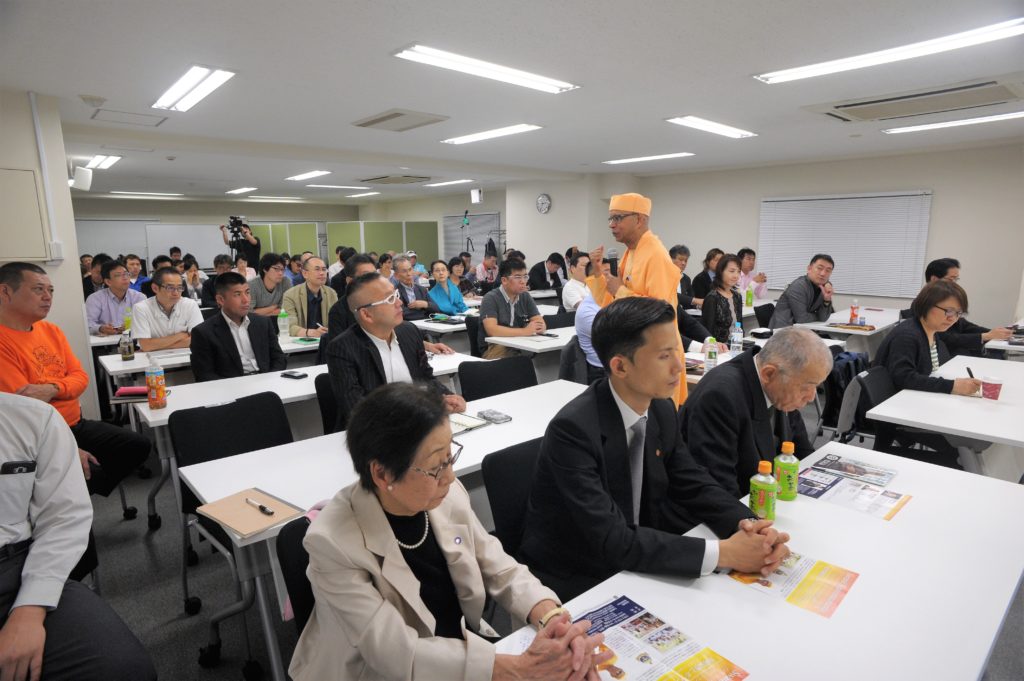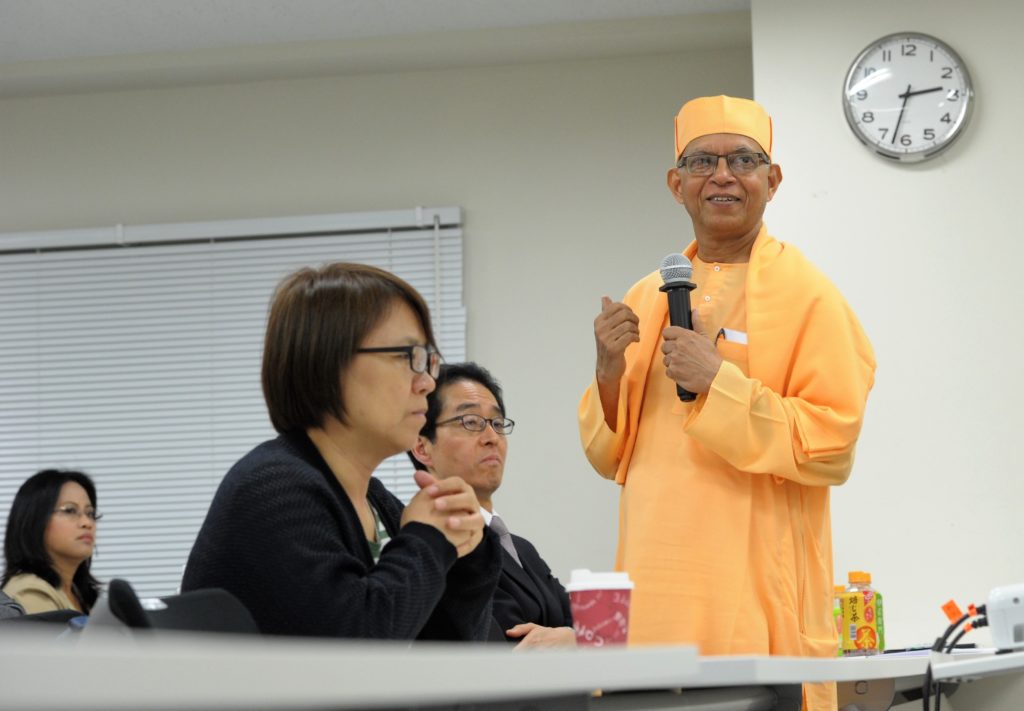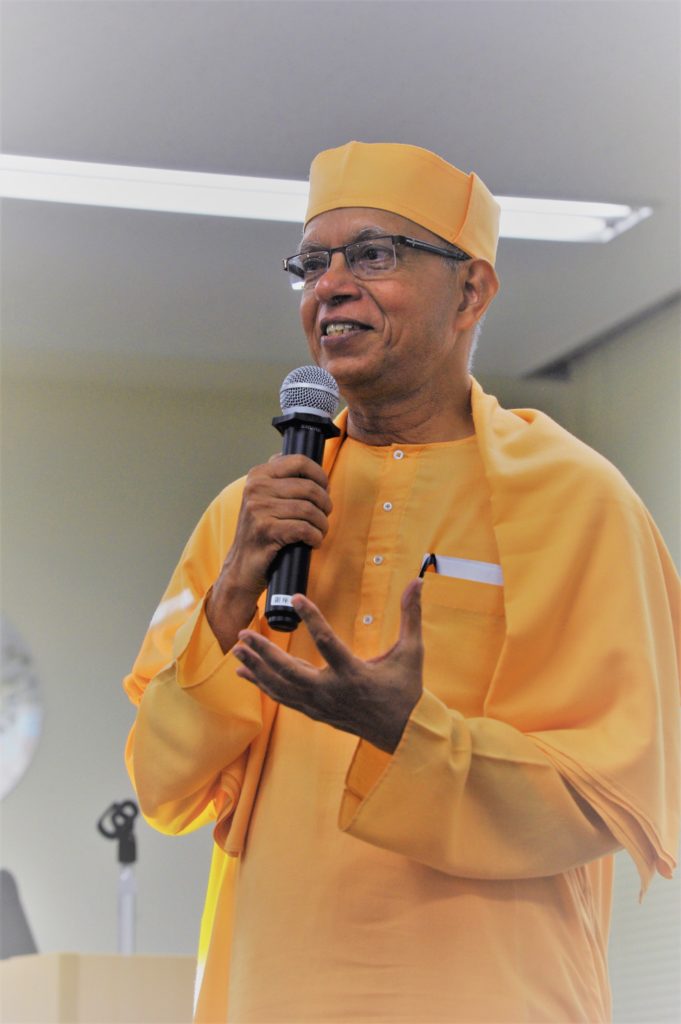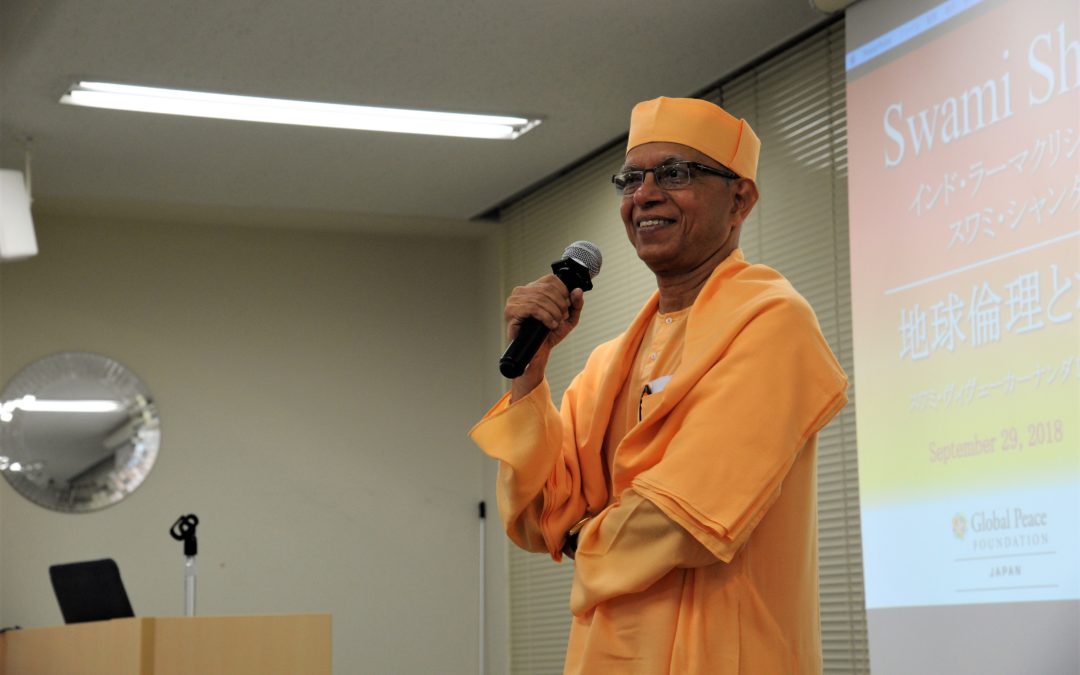The following speech was delivered by Swami Shantatmananda, Secretary of the Ramakrishna Mission in New Delhi, on “Global Ethics and Volunteerism” in Tokyo, Japan on September 29, 2018. Swami Shantatmananda shared stories that animated India’s age-old vision of Vasudhaiva Kutumbakam (One World Family).
Like Vasudhaiva Kutumbakam, there are expressions of the ideal of One Family Under God that are present and alive around the globe. This common aspiration opens the way to articulate a shared framework of ethics upon which to build social cohesion and shared prosperity.
I am extremely happy to be here this afternoon. This is my first visit to Japan. Although I have seen most of the globe, including Russia, I didn’t have an opportunity to come earlier to Japan. So, thanks to Global Peace Foundation and our friend Kawabata San, I’m happy to be here.
I represent an organization called the Ramakrishna Mission. It’s a Hindu monastic organization. We are about eighteen hundred monks. We have more than two hundred branches, of which 150 are in India and the rest in other countries. We work in several fields such as medical service, educational work, relief and rehabilitation, rural development work, tribal development work, etc.
We stand for religious harmony; we accept all religions as true. In fact, among several monks of our Order are those with Christian background, Buddhist background, Muslim background, Jain background, and so on.
Swami Vivekananda at the 1893 World Parliament of Religions

Swami Shantatmananda, Secretary of the Ramakrishna Mission in New Delhi, speaking in Tokyo, Japan.
This organization was founded by Swami Vivekananda, a great Hindu monk. He represented Hinduism in the first world parliament of religions held in Chicago in 1893. He was a very young monk, hardly thirty years old when he went there, and he had never spoken before from a public platform.
There was a huge audience of about several thousand people and he was very much nervous when he saw the crowd. So, whenever the organizer called his name, he said “later, later, later.” Finally, they said, “you have to speak now. There is no more later.”
He stood up, mentally offered a prayer to the goddess of learning called Saraswati in Hindu tradition. He addressed the audience, as Sisters and Brothers of America. It resonated in the hearts of all those present there. They gave a tremendous applause for the next several minutes without stopping. Suddenly the unknown monk became a world celebrity. He gave a short speech on that day. His main theme was that all those people may be pursuing different paths, but they all lead ultimately to the same God.
He gave several speeches during that parliament and gave a very wonderful speech towards the end about religious harmony. He said we not only believe in toleration, we believe in total acceptance. Toleration means, “I’m superior, you’re inferior. I’m just tolerating you.”, whereas acceptance means, “I value you as equal.”
For the first time, a religious leader spoke from a world platform about the dire need for harmony of religions. He said that the Hindu is not to become a Christian, the Christian is not to become a Muslim, and the Muslim need not become a Hindu. But each must assimilate the good ideas of other religions, and integrate them into their own belief. He finally said “Upon the banner of every religion will soon be written in spite of resistance ‘Help and not Fight,’ ‘Assimilation and not Destruction,’ ‘Harmony and Peace and not Dissension.’”
Vasudhaiva Kutumbakam. We Are One Family
He gave a new message to the whole world as to how we can live together as a beautiful community. So, you know, the whole idea is as long as we identify the goodness in others, it’s always possible to live in harmony. In fact, that is true even in families, in our friends circles, in our business, everywhere this idea: identify the goodness or noble ideas and leave aside the differences, then we can live meaningfully together.
“…as long as we identify the goodness in others, it’s always possible to live in harmony. In fact, that is true even in families, in our friends circles, in our business, everywhere…”
These ideas are based on some great truths of Hinduism. Not only that, they resonate in the basic tenets of every religion. For example, all the religions believe in an ultimate God or Creator. So, if you’re all created by God, by whichever name that addresses that personality, you’re all brothers and sisters wherever you might live, in Africa, England, America, Japan, India or anywhere; we’re all belonging to one huge family. That is what they call in India Vasudhaiva Kutumbakam. One Family. We are all members of one huge global family.
“…you’re all created by God, by whichever name that addresses that personality, you’re all brothers and sisters wherever you might live, in Africa, England, America, Japan, India or anywhere; we’re all belonging to one huge family.”
Imagine if we accept this one idea, how so much peace and harmony will be there in this world. There will be no need to go to war between countries. This is based on an even more fundamental idea, which our friend who spoke before me expressed in Japanese. But in Hinduism it means it is inside everyone. All goodness, power, knowledge, greatness, ability, strength— everything is in all of us. That is the basic point of Hinduism because Hindus believe that we are not just this body or mind, but we are beyond. We call it as “consciousness” Atman or brahman in Sanskrit. But 99.99% of mankind does not remember this. They have forgotten this idea.
So, religion or spirituality means awakening to this great potential within us. So that is the real work of all spiritual masters, or gurus, or teachers: awakening you to your own potential or greatness that is lying within you. But I know that people all over the world have forgotten this and they fight with each other in the name of religion. Without invoking any great philosophical idea, Swami Vivekananda brought this out in the parliament of religions using a beautiful story. He said, “Why do we disagree?”
The Frog and the Sea

Swami Vivekananda sharing a story of a frog and sea and comparing it to religious barriers.
There was a frog which was living in a well. It had never gone out of that well. So, he thought the whole world was his own little well. One day, another frog from the sea accidently fell into that well. So, the frog in the well asked the other frog, “Who are you? Where from have you come?” The sea frog said, “I am from the sea!” The well frog jumped from one end of the well to the other end and said, “Your sea? Is it as big as this?” The sea frog laughed and said, “My friend, how do you compare your little well with my sea?”
He said, “You have never seen the sea. Please come with me. I will show you the sea.” The well frog got angry and said, “You are a liar. You get out! You want to take me to the sea and occupy this well. There is nothing bigger than this well in the whole world.”
Swami Vivekananda said that is our problem. The whole audience erupted into a huge applause when they heard the story. He explained the Hindu sits in his own little well and thinks the whole world is his. The Christian sits in his own little well and thinks the whole world is his well of Christianity. Similarly, the Muslim sits in his own little well and thinks the whole world is his. Actually none of us have seen what is offered by the other religions.
That’s why he said every religion has produced men and women of great exulted character. Every religion has produced extraordinary men and women. Purity and greatness are not the property of any particular religion. These ideas of Swami Vivekananda were learned by him under his guru, Ramakrishna Paramahansa, a great saint.
The Common Goal or Religion
Swami Ramakrishna practiced several religions like Hinduism, Islam, Christianity— he observed meticulously all the practices of different religions. Based on his own personal experience, he declared “as many faiths, so many paths.” There are different paths leading to the same. He also used to give a beautiful example of a water reservoir. Hindus take the water and call it jal. Christians use the same water and call it water. Muslims call the same water Pani. He said ultimately, all the people of various religions reach the same goal but the path or the way is different. So, he said, “Let us not fight about the path. Let us talk about the ultimate goal.” That’s why he said religion is spiritual practice and the ultimate realization, the ultimate goal— that is important.
“Let us not fight about the path. Let us talk about the ultimate goal.”
So, Swami Vivekananda thought that all these should be made practical in life because we may discuss many good theories and ideas, but unless they are brought into our practical life, they will be of no use to mankind. That is why most of the people all over the world are generally moving away from religion. Even those who believe in religion think that it is just a ritual, or going to a temple, or a mosque or a church, and at other times doing what you like.
There is no connection between our outer life and our religious life. They are poles apart. In India the Hindus, when they advance in spiritual life, would give up society and go to the forest and practice Vedanta. That would be a very small percentage. Maybe one or two percent of the population. So, Swami Vivekananda gave a new interpretation to religion. He said that religion, which has gone to the forests, should be brought to the marketplace. They should be part of our daily life. You may be a teacher, you may be a model, you may be an actor, you may be a musician, you may be a doctor, you may be a lawyer— all of you should be able to apply these principles we call Vedanta.
There should be a complete connection in our life: what we believe as true and what we practice by way of profession. There should be a complete link. There should be a flow. Otherwise life is meaningless. In fact, this is the basis for global ethics, morality, volunteerism and all that we think of as good and moral.
“There should be a complete connection in our life: what we believe as true and what we practice by way of profession…Otherwise life is meaningless. In fact, this is the basis for global ethics, morality, volunteerism and all that we think of as good and moral.”
I visited a school yesterday and they said they are teaching morality to the students. I asked them, “If the student asked you what is the basis, how would you answer them?” Because when you tell children, “You should be good, you should not steal, you should not tell lies” they turn back and say all those who tell lies, who steal, are living a great life, why should I not do too?
The Practice of Service
So, this principle, the world is one family, Vasudhaiva Kutumbakam, or the idea of the practical Vedanta, that we are all children of God, these are some of the ideas which are the basis of all ethics, morality, values, volunteerism, and all that. Because, if we are belonging to the same family, we cannot steal from our own brothers and sisters. We cannot cheat our own brothers and sisters. We cannot take bribe from our own brothers and sisters. We cannot be immoral with our own brothers and sisters.
So, to propagate this idea, Swami Vivekananda returned from America in 1897 and set up this organization called the Ramakrishna Mission. So he gave two objectives to this organization, Moksha or spiritual welfare of the individual along with welfare of the world; spiritual evolution, spiritual growth for the individual and welfare for humanity or the world at large. He said the two objectives are, first and foremost, my own spiritual evolution, “I grow spiritually.” All humanity should grow spiritually. That is the basic understanding of all religions. So this organization will promote individual growth in spiritual dimension. But this spiritual growth with come through the service of others.
You see, Swami Vivekananda used to say always, “The world does not want the least from you.” It is not expecting the least from you. So, all the service, etc. that you do, is for your own purification or spiritual growth. He will always say that the giver is more blessed than the receiver. Supposing no one wants to receive any help, then where will we go and do philanthropy? So that is why you say that the giver is more blessed than the receiver because he gets an opportunity to serve others.
The giver is more blessed than the receiver because he gets an opportunity to serve others.
So, you know, in this organization, all the aspects of human personality are practiced. There are four aspects of human personality. Swami Vivekananda used to say that there are four types of human personality: the Jnana type or those that inquire or question; the Bhakta type or those that are soft and emotional; the Yoga or the meditative type; and the Karma or active type, those that believe in tremendous activity or work.
He said that any path, either the path of knowledge, or jnana, the path of bhakti, or emotion or devotion, the path of yoga, or meditation, or the path of karma, or activity— any path will lead you to the highest goal of life, or realization of the highest truth.
So, unlike traditional Hindu monks who used to go away from activity into the forest to practice meditation, the Ramakrishna Mission monks live in the society and work intensely to serve others. You must understand what is the basis of this karma yoga, or philosophy of work. You must also understand the difference between karma and karma yoga. Karma means any activity. Yoga means “union.” Karma yoga means union with the God or the highest truth using karma as the path.
So, this karma yoga can be a great basis for the whole mankind to serve others. See in the whole world, there is so much need for service in every part of society, rich or poor, irrespective of the economic condition. Whether it is America, or Africa there is need for service. In different places, different kinds of service are needed.
But two ideas are to be remembered in our mind if our service is to be really fruitful to us. If our service is to help us individually, the server should think “I am rendering service. How can I benefit? What will be the philosophy that can help me benefit?” The principle is as I have already said, “I am serving. I am blessed. I am privileged.” Not standing on a higher platform and throwing relief materials. “I am superior! You are inferior! You are poor. You are deprived. I am giving you.” No, not that idea. The idea is, “I am serving the God in front of me in the form of a beggar, in the form of a patient, in the form of a depressed person, in the form of anybody needing service. In the form of all those persons, I am serving God.”
“I am serving. I am blessed. I am privileged.”
Based on this principle, the Ramakrishna Mission is running a large number of hospitals and dispensaries, schools, colleges, and even a university. Probably one hundred thousand students study from kindergarten up to the level of doctorate in our institutions. More than ten million patients are treated every year through our hospitals and dispensaries.
All of us are constantly struggling to remember this idea and work so that we serve and also progress spiritually but it’s not easy; it’s a hard task. So, you know the thought might arise in your mind, “Is it possible? Has anybody done it?”
The Monk Who Dressed Wounds

Swami Vivekananda sharing a story about service and volunteerism.
I want to share a real-life story with you. We have a poor men’s hospital in Varanasi, a very famous place for pilgrimage in India. It has a very minimal facility, nothing super special about it. Some sixty years back, a new monk of the order went to serve in that hospital. He was not much educated. He had come to our main center in Kolkata and the president of the order told him, “You go and serve the patients in Varanasi. Through that you will gain everything.”
He went there. He did not know anything about medical work. They gave him a small table, some scissors, medicine, and bandage material to serve in the OPD. His job was to clean the wounds of patients, dress them, apply medicine, and send them back. Slowly he became so famous, people would come from fifty, sixty kilometers to be dressed by him. His touch was miraculous. People would come with gangrene, very bad stinking wounds, but by his dressing, over a few days, they would recover completely and go back.
Varanasi is famous for a temple of Shiva called Vishwanath Temple. Shiva is a stone image and it is fixed. People would say that Shiva in the temple does not move; the moving Vishwanath is in this hospital, this swami who is dressing the patients. They would call him “the moving God.” Every day he would go at 8 a.m. to the outdoor department and come back at three, standing all the time dressing the patients. He served with no break for thirty years.
Slowly, he developed a serious rheumatism. He could not walk but he would drag himself and go every day. He wouldn’t absent himself.
Finally, he could not walk at all but he said he would go in a wheelchair. And once he was made to stand up, he would again dress wounds for eight hours.
When it was impossible even to stand, finally he took retirement and at that time I went and saw him. His very presence would give you so much peace and happiness. His face would beam with so much peace and joy.
So, this philosophy of Swami Vivekananda, serving God in man, is something which can be adopted by all communities around the world. This can be the real basis for global, ethical volunteerism.
The Work of Ramakrishna Mission in Delhi
I want to tell you briefly about what we do apart from this, another great work of Ramakrishna Mission Delhi. That is, we are working with five thousand schools and giving a real basis for ethics, morality, and values for children. The children are responding beautifully. Even physically handicapped, visually impaired children are responding because we are giving them the real foundation or basis for ethics and morality.
The real foundation or basis of this philosophy is the intrinsic greatness, power, or equality of all individuals irrespective of powers of intellect or other physical abilities. In spite of whatever we are, wherever we might be— very bright, not so bright, intelligent, not so intelligent, physically powerful, physically weak or handicapped— all of us are intrinsically blessed with many great qualities and awakening them is the real purpose of education.
Thank you.

